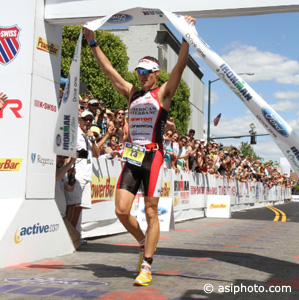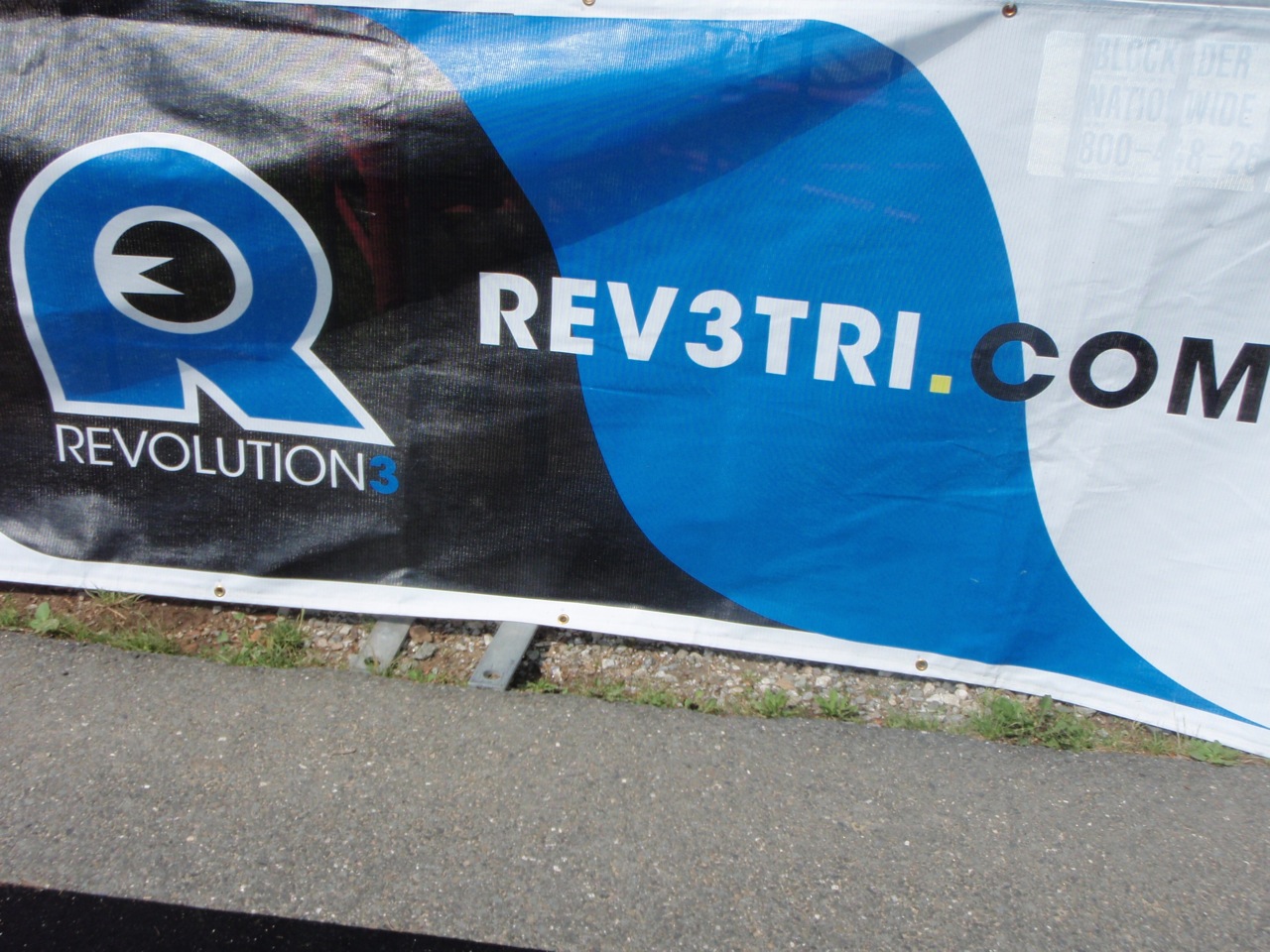Craig Alexander says his best is yet to come
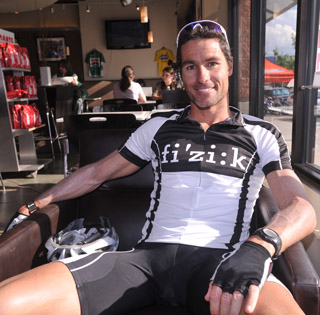
For the past four years, Craig Alexander has been the epitome of the professional Ironman triathlete and that meticulous attention to detail and smart preparation and talent has paid off with a 2nd, two wins and a 4th place finish at the Ironman World Championship. But just as a new wave of Ironman talent seemed to be cresting with the likes of Andreas Raelert, Marino Vanhoenacker and the much anticipated arrival of two-0time Ironman 70.3 World Champion Michael Raelert, the temptation is to say that the 38-year-old Craig Alexander is part of the old guard and his best days are behind him.
Such attention-deficit thinking was bolstered by a recent attack of a debilitating virus. But Crowie fought back with an impressive race-record 2:46 run and 8:19 overall time at Coeur d’Alene. Alexander spoke with Slowtwitch last week at Amante coffee shop in north Boulder.
Slowtwitch: What did your 6th place at Abu Dhabi signify?
Craig Alexander: I was in great shape but I was nowhere near as fit as I intended to be for Ironman Australia eight weeks later. I was pretty happy with my result, three minutes 32 seconds behind [the winner] Frederick Van Lierde. It is a flat bike course which probably suits the bigger guys with power. But I rode with the lead group for about 160k that day. I was happy with Abu Dhabi. I finished sixth even though I cramped a lot in the last 40k of the bike and on the run.
ST: Any satisfaction in outperforming Macca there?
Craig: Not really. When organizers heard we were both racing, they called it The Jewel in the Desert. But the truth is neither of us won. I finished sixth and he was a long way back and didn’t finish at all.
ST: That’s a long, hot, high-speed power-fest. How did you feel afterward?
Craig: I flew home to Australia and had a recovery week and then did probably three of the best weeks of training I’d had in six months. I was feeling really good, especially swimming and running. But then on April 10 I got sick. You can’t plan for that kind of thing.
ST: Where were you?
Craig: I went in to watch the World Championship Series race in Sydney and went to a dinner that night hosted by Triathlon Australia. I had a few sponsorship commitments that day and the Monday after the race. On Tuesday, I worked out but didn’t feel so great. That night I had a fever and I didn’t sleep at all and Wednesday I couldn’t train at all.
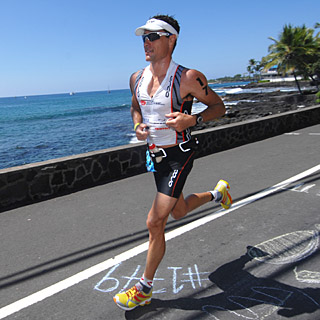
ST: How rare was it for you to get sick?
Craig: In the last 10 years, I’ve only had one or two forced layoffs. My wife Neri has been an emergency nurse for 15 years and had me see a doctor. I went to a local general practitioner who put me on antibiotics because he thought I had a bacterial chest infection. A week later I was worse so I went and saw another doctor – ironically, Greg Welch’s old doctor –who said the antibiotic hadn’t worked because it was viral infection. They called it the 100 Day Cough — it attacks the upper respiratory system. They said that if I continued to train hard and compromised my immune system, it could move around my body into the heart and other places. So I took another two weeks off, which took us right up to a week before Ironman Australia.
ST: When did you pull the plug on Ironman Australia?
Craig: These things can linger a long time, so it’s best to nip them in the bud. When I came across the second doctor, we were a week out from the race. At that point I hadn’t trained for two and a half weeks and the doctor said ‘It’s crazy to race.’ After the decision, I stayed home in Cronulla and took four weeks completely off training. Finally, when my resting heart rate came back to where it should have been, I started some very light training once a day about three weeks after Ironman Australia. A 30 minute spin on the trainer and a few light sessions in the gym.
ST: When did your body start to feel normal?
Craig: I think I coughed for about 60 days. Whatever the virus was, it attacked the upper respiratory tract. Symptoms were a narrowing of the airways, a tickling feeling and a persistent dry cough.
ST: How did you treat it?
Craig: I had to get special exemption to go on Ventolin – an asthma medication. The doctor who prescribed it went to Australian sports authorities and found out the legal dosage for athletes to take. The first day I was on it ASDA [the Australian dope testing agency] came to our house for an out of competition test. The Ventolin helped open the airways. It still took three weeks for the cough to really subside. After those four weeks off and a couple of light weeks, my training wasn’t too far back.
ST: Were there any complications?
Craig: Because I coughed so much I strained my rib cage and I injured some cartilage. Anyone who has ever had damaged rib cartilage knows it is a very painful injury. It’s hardest on the swimming – when you extend your arm above your head – and it’s also painful with the impact and the jarring from running.
ST: When could you train at full strength? As a former winner, you still have to complete an Ironman in the same year to take advantage of your Kona qualification.
Craig: By the end of May I was doing sessions and not feeling trashed so I set my sights on either Coeur d’Alene or Frankfurt. I liked the idea of Frankfurt because it gave me an extra four weeks to train. But Coeur d’Alene was earlier and closer to our home in Boulder.
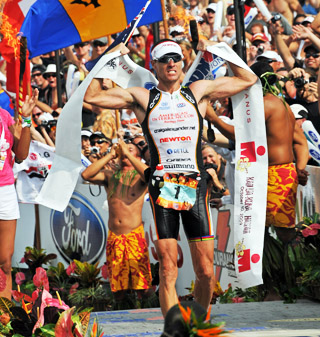
ST: You set a race record at Coeur d’Alene. Why did it go so well?
Craig: I felt good and had my own plan to ride within myself. Still there was a little bit of the unknown. It was just my second race since Kona and my first race since Abu Dhabi. I really wasn’t sure how I was going to hold up. But once I got going, I was feeling very good and very comfortable on the bike and feeling strong on all the hills. At the end of the first loop, Maik [Twelsiek] had about a 2:15 lead. At that point Tom Evans,. Sa five-time Ironman winner at age 42, was another 4-5 minutes behind me.
ST: How much of a lead you could allow Maik?
Craig: I was happy to be 2:15 back of him at the end of the first loop of the bike. I could see Maik was on a tear, so I was content to ride within myself and felt strong on the hills. He definitely pulled away on the second loop. He broke the old bike course record by 9 minutes. I think only two people have broken 4:40 and he rode 4:29. I knew it would be Maik’s tactic although I was surprised to see by how much he broke the record. I rode 4:38 and think I broke Mike Lovato’s old bike course record as well.
ST: After losing all that training time, did you fear that you would fade at the end?
Craig: That thought crossed my mind but I decided to run out the way I always do. Which is to find a comfortable pace I can hold all the way. For 23 and a half miles or thereabouts, I felt good. I started off at 6 minute miles (a 2:37 marathon pace] and I went through halfway in about 1 hour 20 minutes. I was 2 minutes 15 seconds behind – just where I needed to be. I caught Maik around Mile 14 when he was walking through an aid station. I ran a 2:46 marathon and finished in 8:19:48 with a 5 minute lead on Maik.
ST: How did your bike start off at Kona last year?
Craig: When we started the ride, there was a main pack of 17 guys, and several times small groups tried to break away. At one point Faris [Al Sultan] and Timo [Bracht] tried to ride away. Another time Eneko Llanos went with Timo. Marino [Vanhoenacker] actually did get away. The danger was that more guys would escape from the group and get up with Marino and Andreas [Raelert.]
ST: So what were you doing about that?
Craig: I think as defending champion people look to you to shut down those gaps. You can do it — but not all day long. I was able to do it for 50-60 miles. Then the pack eventually split just before Hawi. I think Raynard [Tissink] was one of the last to get across and join them. At Hawi, the rest of us we were two minutes down to the leaders. At Kawaihae, at about 72 miles, we were 3:45 down. More important, we were getting reports that the pack, including three Commerzbank guys – Timo, and Normann and Marino — were working well at the front. It felt like no one in my group wanted to help me. I sat up at the front for a long time. Thirty miles later, Dirk Bockel joined us after serving a 4-minute penalty. The he rode through our group that included Eneko [Llanos,] Andy Potts, Cam Brown and Terenzo [Bozzone]. .
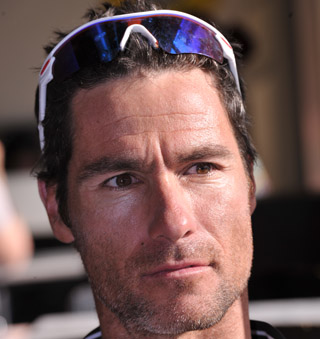
ST: Why didn’t you go with the first break? And why not with Bockel?
Craig: I felt we had a lot of firepower in our group. So I didn’t think that was the winning move. But 30 miles later – when Dirk came up — it became evident it was the winning move when we heard how they were working as a group — and we weren’t. Some guys in our group were unable to help — and there were others who were unwilling.
ST: How did you feel about that?
Craig: That is just racing. I think only a handful of people know what that is like to go in as a multiple champion. Tim [DeBoom] and Peter [Reid] came back after winning twice. And of course, six time champions Dave [Scott] and Mark [Allen]. It is quite a dynamic because the other 100 guys in the field are forming their strategy keying on you.
ST: Do you have a philosophical dispute with how the lead group worked together?
Craig: It is a no-drafting race. But if different people are leading the pace at different times and there is an incentive for everyone to share the workload – and they all remain a legal distance behind the bike in front — it is fair. People who’ve read Macca’s book tell me that he said that Faris and Normann got crazy at the front trying to show who was the best bike rider. And this helped everyone get a great dynamic going. Tactically it was a smart move. Macca got that group going and Andreas and Chris got off the bike with a big lead on me. I thought they were the two most dangerous men in the group. Whereas in our group, everyone was watching each other and we were getting splits telling us that we were falling further behind.
ST: What do you think about Macca’s tactics?
Craig: I took it as a compliment that he put that much thought into it. Maybe he’s tipping the hat at me saying they needed to do all that to beat me. Some people said I had been blindsided by it. But it was no secret. The truth is I’d heard about it for a full year. Not many people know it. I’ve only told Neri. But 30 minutes after I won my second title in ‘09, I was in the medical tent getting an IV. Then I walked over to chat with a couple of the guys who finished in the top 10 and we were swapping war stories. Straightaway, one of them told me “It’s gonna be hard for you next year. The boys are already getting together and planning a strategy
ST: Some people must now be urging you to recruit some support riders yourself?
Craig: That is funny. Some people close to me were saying “You need to do the same. Why not recruit some people and get some help?” I disagree. Who’s gonna help the two time defending champion? ‘C’mon guys! Help me win a third one.’ It’s a tough sell when you’ve won two in a row. Going into 2010, I’d done Hawaii three times and had a 2nd and two wins. Some people suggested that I start to pay people to help me. To me that is totally and absolutely not in the spirit of the race. And it is not in my nature to do that. A lot of the guys in that race are my friends. I do not want to use them up for my own gain because they are out there trying to make a career for themselves and try to win money for themselves.
ST: What did you think was the maximum you could surrender to Macca and Raelert on the bike and still run them down in Kona?
Craig: After their fast bike, I didn’t know what they were going to run. But I thought I was going to jump off the bike and run 2:36 [six minutes flat per mile , 4 minutes faster than Mark Allen’s race run record]. That is was my mindset. I started running a pace that would yield me a 2:36. It would have been close, but honestly I think Chris would have held me off. I think he still had a minute or two up his sleeve [faster than his 2:43]. It is not ideal when you hear you are that far back. But there is still a marathon to run and anything can happen.
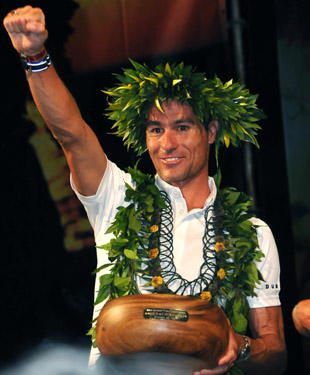
ST: So you got beat. But how would you evaluate your performance?
Craig: I had a good day. I didn’t have a superb day – or the great day that you need to win there. At some point, whatever tactics were involved, you just have to say I finished fourth and three people finished ahead of me and they deserved it. I have no real negative thoughts from that race.
ST: How would you explain your tactics on the bike and run as the fields get deeper and faster, especially on the run?
Craig: Look at my record in Kona – I’ve had a 2nd, two wins and a 4th. I’ve also won the 70.3 world title and placed 4th there, which came four weeks after my first Kona appearance in ‘07. I’ve won Life Time Fitness and had a couple of other podium finishes there — against the likes of Simon Whitfield, Hunter Kemper, Hamish Carter, Andy Potts Matt Reed, Craig Walton and Greg Bennett and Bevan Docherty. I’ve won Chicago a couple of times.
ST: What does that tell us?
Craig: That you don’t just win races with your run. You win because you are the freshest during the run. In Coeur d’Alene I could have ridden 6 or 7 minutes quicker. Say instead of 4:38, I ride a 4:32 – six minutes quicker. Do I then only run six minutes slower so the net result is the same?
ST: I doubt it.
Craig: That is exactly right. Triathlon is about the total time. That is the sport. So you have to calculate that foremost in a long distance race. Ironman Hawaii now is very competitive and very strategic and deep with the talent. But it is still an individual time trial. You want to stay as close as you can to threshold the whole day. If you look at the best marathons period, or the best marathons in an Ironman, or the best time trials in the Tour de France or the best time trials in any triathlon. they are even splits. They are not crazy fast in the first half and then a lot slower. That is a silly way to race.
ST: Do you always keep to your plan and ignore the ebb and flow of competition?
Craig: Sometimes you have to go over threshold because you have to stay with your competitors. Sometimes you are at the limit and you can’t go any more. But the goal is to have the fastest overall time. I mean the strange thing people say is that I am a simply a runner. I say that's because I swim and bike to a plan. That being said, I race to a different plan in some races. The year I won Life Time Fitness [2005], Matt Reed and I were the aggressors on the bike. We were the ones who shook up the pace and got rid of a lot of guys wearing out their legs.
ST: What do you say to critics who claim you are a weak cyclist?
Craig: They may question my bike riding. But take this into account: I didn’t lose a 70.3 race in three and a half years. I was racing against the best 70.3 athletes in the world. That included a world title in '06 in the inaugural year of the 70.3. And when you evaluate a career, I think it’s not just the races they have won. That is the important part of it. But when they don’t win, where do they finish? Are they still contending? I say there is so much depth and talent in our sport now, it is ever harder to be consistent. Look at the Paula Newby Frasers, the Mark Allens, the Simon Lessings – they set the bar high. I am a student of the sport and I know that Lessing, Welch, Allen, Molina, Pigg — and in recent times Greg Bennett, Craig Walton, Simon Whitfield, Bevan Docherty and Hamish Carter – they are all consistent. You can’t win ‘em all because you are coming up against fierce competition each time. I think a key part of the battle is putting forth a performance that is within a certain range of your own high expectations.
ST: Maybe they don’t want to help you because they see you – accurately or not — as a weaker cyclist? If it has been your strategy to hold off a bit on the bike to ensure a faster dominating run, therefore they must think it won’t help them to work with you?
Craig: I will answer that question with a question. How do I consistently win most of my races, come close on the bike and have the best run splits at every race that I do? I don’t believe it’s because I am the best pure runner at Ironman or half Ironman.
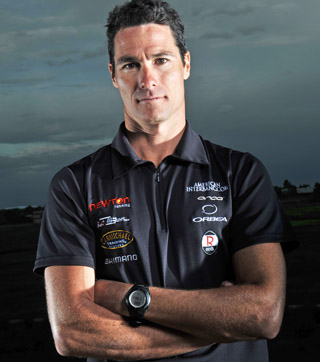
ST: In various sports the window of great performances are different. In swimming the end can come at 25, in tennis it seems to be 30 and Sports Illustrated wrote that 33 is the age when major league baseball shortstops start to decline and 37 is maybe the final hurrah for Hall of Fame shortstops. The limit so far your sport, the big milestone, has to be defined by Mark Allen, who won his last Ironman World Championship at age 37. Another definition of the limit might be Dave Scott’s Ironman Hawaii second place at age 40. So how much longer can you be great? How much longer can you win at Kona?
Craig: Now elite triathletes they are pushing the limits, especially with advances in nutrition and sports science. There are so many different modes of recovery now. I think part of it would be genetic. And part of it would be how many miles you have spent pushing the engine into the red? Personally I started in the sport late. I played soccer for 13 years. I started triathlon in the early 20s and I was still in University and I had part time jobs until the year 2000.
ST: What is the key to your longevity in the sport?
Craig: I have been very professional with my recovery and have been blessed with great biomechanics and, I guess, great natural powers of recovery. But there are so many more things you have to do. I think I got into my peak years without much wear and tear. In 1999, I had a full time job and I was commuting to Sydney every day. Back then I didn’t migrate to the northern hemisphere. I just stayed home and worked. I think those breaks I gave my body in the early years are paying off now.
ST: Is it just physical?
Craig: No. I think you get to a point, you must ask yourself the question: Are you prepared to do the things that the young guys are prepared to do, the things that you used to do when you were young?
ST: How old are you?
Craig: I just turned 38 last Wednesday.
ST: Do you look at Mark Allen and reflect on the fact that he won his last Ironman Hawaii at age 37? Do you have another Kona win in you?
Craig: You’re playing devil’s advocate and it’s a great question. But I look at it this way. I’ve done four races at Kona with two wins, one second and a fourth. Yet I believe my best race at Kona is still in me. It’s not just physiology, which is important, of course. It's experience and tactics and smarts. Chris [McCormack] had his best performance after racing for nearly a decade there. It was maybe his 9th race there, and he spent the best part of a decade accumulating knowledge and experiences. Every year the conditions are a little bit different. Every year the race pans out differently. But after you’ve been there enough times, you’ve seen the scenario before and you know how it plays out.
ST: Every year you have come off the bike 8 minutes down to your stiffest competition. In 2008 and 2009, your closest rivals have not had the run to fight back and hold their lead. But last year, you came off 8 or 9 minutes down to guys who were about to run 2:43, 2:44 and 2:46 respectively. Was that a mistake?
Craig: You are the master of your own destiny. I am not going to make any excuses. Maybe I made the wrong decision at the wrong time. Maybe I shut down too many moves at the beginning and didn’t have enough energy when the real moves went off. You can't always know when it happens. And some times you are not in position to answer. I respected every one of those guys. Ultimately, you cannot blame circumstances.
ST: Can you win at Kona again?
Craig: Maybe I’m deluded. But I believe I can.
ST: You are going to race the Ironman 70.3 World Championship in Las Vegas this year?
Craig: Yeah I am. Perfect timing. I feel my best race the last three years has been Muskoka, four weeks out from Kona. I feel I have my best middle distance race in September. So that race has always been gone perfectly for me. I’ve always felt my best distance is the half Ironman. I’ve had winning streaks and some of my best performances have been at that distance. So I want to go back and contest.


